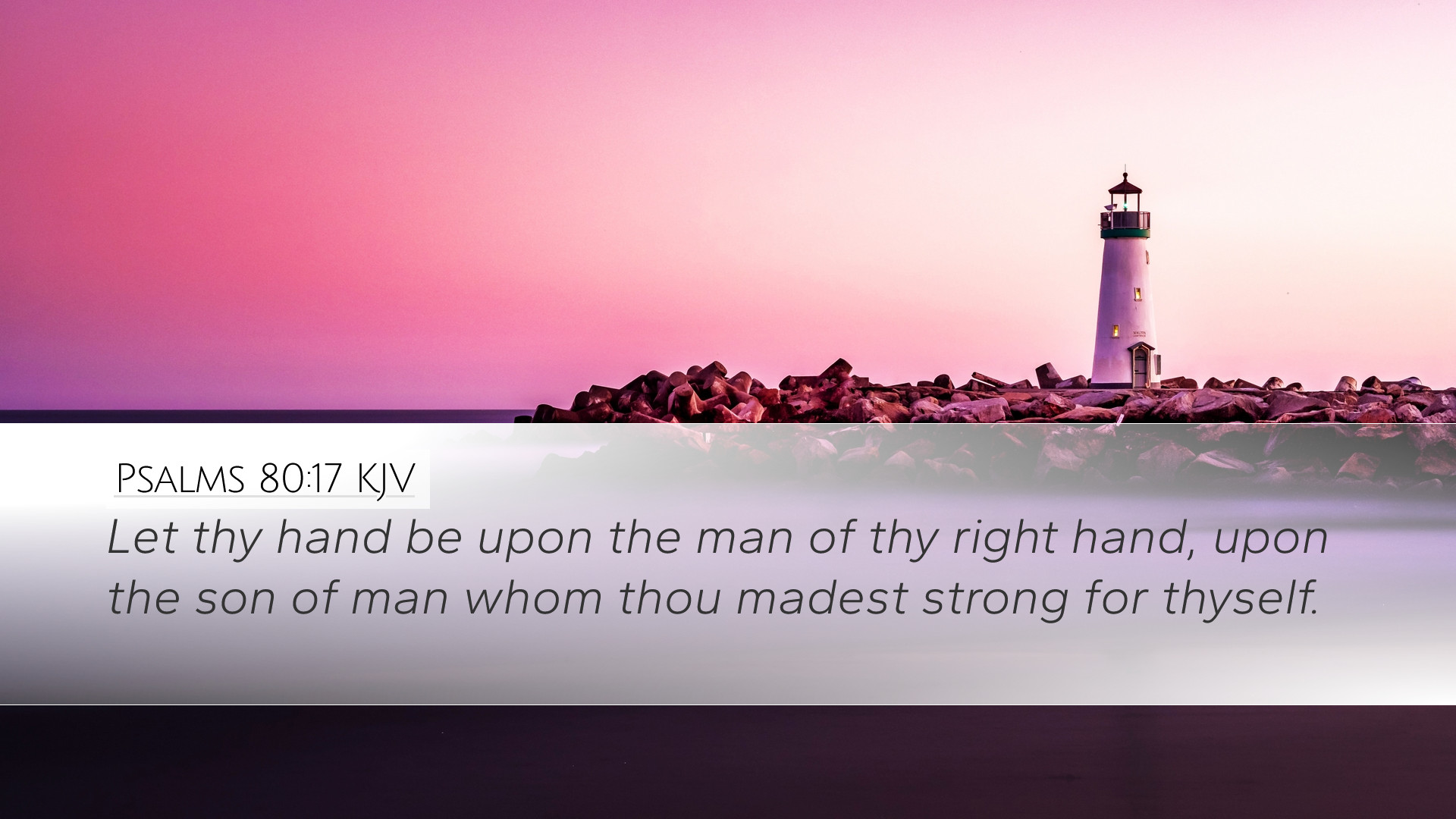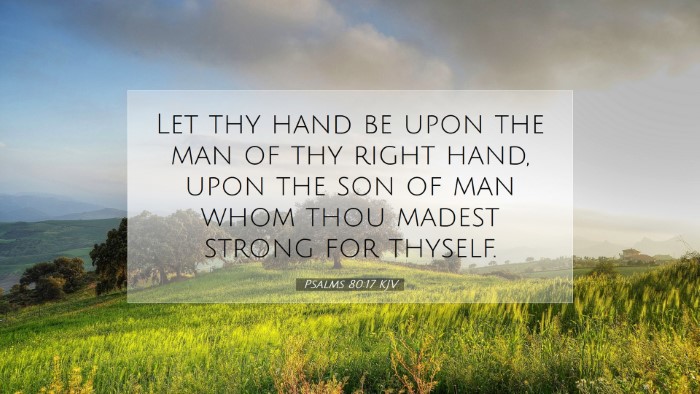Commentary on Psalm 80:17
Psalm 80 is a poignant plea for deliverance and restoration. Verse 17 stands out as a significant part of this plea, encapsulating the themes of divine presence, human need, and communal identity. This commentary synthesizes insights from several public domain sources to provide a comprehensive understanding of this verse.
Text of Psalm 80:17
"Let your hand be upon the man of your right hand, upon the son of man whom you made strong for yourself."
Exegesis and Thematic Analysis
1. The Importance of Divine Presence
Matthew Henry emphasizes the necessity of God’s hand upon His chosen representative. In the context of the psalm, the "man of your right hand" is interpreted as the king of Israel, possibly a prophetic foreshadowing of the Messiah. This invocation for God’s hand reflects a desire for divine involvement in leadership and governance.
2. The Man of Your Right Hand
Albert Barnes provides a crucial insight into the title “the man of your right hand”. This designation indicates a position of honor and authority. It suggests that this figure is not merely a ruler but is specially appointed and empowered by God to lead His people. The right hand symbolizes strength and favor, implying that leadership is not a human endeavor but divinely ordained.
3. Son of Man: A Title of Identification
Adam Clarke notes the significance of the term "son of man". The psalmist’s usage of this phrase highlights the human aspect of the leader, which is crucial as it creates a bridge between the divine and humanity. It suggests intimacy and identification with human struggles and faults, while also pointing to the ideal servant leadership that God envisions.
4. Divine Empowerment
The phrase “whom you made strong for yourself” indicates that the empowerment of the king comes directly from God. Henry points out that it reiterates that success in leadership—spiritual and temporal—does not stem from human might, but from God’s grace. The people’s acknowledgment of this truth is essential in their cry for help.
Contextual Considerations
Understanding the context of Psalm 80 is critical. The psalm is attributed to Asaph, whose role as a prophet and musician allowed him to articulate the collective pain of the people of Israel during their times of crisis.
1. Historical Context
The historical backdrop of Israel’s calamity—likely during an invasion or exile—infuses this verse with a sense of urgency. The people felt disconnected from God and its leadership, thus the cry for God’s restoration “upon the man of your right hand” reflects deep longing for both political and spiritual recovery.
2. Liturgical Use
This psalm may have been used in communal worship, where collective confession and supplication were vital for unity. Clarke highlights how these sentiments resonate in the hearts of Israel’s faithful, who recognize that their leaders are imperfect and require God’s guidance and strength.
Theological Implications
Psalms often articulate fundamental theological truths. Verse 17 of Psalm 80 encapsulates several key components of God’s relationship with His people.
1. The Sovereignty of God
The request for God’s hand to be upon the leader acknowledges His sovereignty. The psalm reflects the understanding that human officials ultimately serve at the discretion of the Almighty. This affirms God’s control over earthly affairs, reinforcing the belief that ultimate power and judgment belong to Him.
2. Leadership and Accountability
The emphasis on divine empowerment brings forth the idea of accountability in leadership. If leaders are to be considered God’s instruments, they are also subject to His judgment. Barnes expounds that this serves as both an encouragement to the leaders and a cautionary reminder of their divine mandate.
3. Christological Interpretations
Many theologians, including Henry, interpret this verse as prophetic, seeing the "man of your right hand" as a typological reference to Christ. This sheds light on the New Testament understanding of Jesus as the fulfillment of this longing, the ultimate leader who embodies God’s presence and strength.
Application to Modern Believers
For contemporary readers and leaders within the church, Psalm 80:17 offers rich insights into the nature of leadership and reliance on divine assistance.
1. Dependence on God
This verse prompts a reflection on how today's church leaders are reliant on God’s guidance and strength. Pastors and church leaders are urged to seek God’s hand actively in their leadership roles, recognizing their limitations and the need for divine involvement.
2. Intercessory Prayer
This passage encourages congregations to engage in intercessory prayer for their leaders, drawing from the communal nature of the psalm. By praying for God’s presence in leadership, congregations can foster a culture of mutual support and spiritual growth.
3. Christ as the Ultimate Leader
Finally, the verse calls believers to look to Christ as the ultimate representation of God’s hand upon humanity. Reflecting on how He fulfills the role of the "man of your right hand" encourages an understanding of faithful leadership grounded in servanthood and divinely inspired strength.
Conclusion
Psalm 80:17 is a profound reminder of the necessity for divine leadership and empowerment. As believers reflect on this verse, they are reminded of their dependence on God and the importance of seeking His hand in all areas of life—whether in personal situations or in the broader context of church leadership and communal faith.


